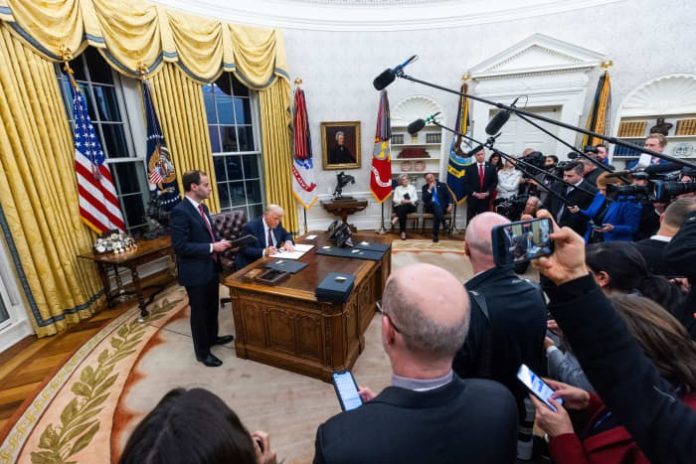Within hours of returning to the White House, President Trump signed an executive order to end birthright citizenship.
Most legal experts say the Fourteenth Amendment of the U.S. Constitution guarantees birthright citizenship, the automatic granting of citizenship to children born in the U.S.
Trump’s order has already drawn legal challenges, which could eventually be decided by the Supreme Court.
Here is what to know about birthright citizenship:
What does the Constitution say about birthright citizenship?
The first sentence of the Fourteenth Amendment, known as the Citizenship Clause, states: “All persons born or naturalized in the United States, and subject to the jurisdiction thereof, are citizens of the United States and of the State wherein they reside.”
The Fourteenth Amendment, passed by Congress in 1866 and ratified by the states in 1868, was one of three amendments from the Reconstruction era to abolish slavery. The amendment was meant to supersede Dred Scott v. Sandford, the Supreme Court decision from 1857 that denied citizenship to the descendants of slaves.
Most legal scholars say the amendment’s meaning is clear: People born in the U.S. are citizens, regardless of the citizenship of their parents. The federal government has long operated on an understanding that birthright citizenship is mandated by the Constitution.
“Trump’s move here is flagrantly unconstitutional and no president can rescind birthright citizenship,” said Thomas Wolf, a lawyer at New York University’s Brennan Center for Justice, a public-policy think tank.
What does Trump’s executive order say?
Trump’s executive order adopts a different reading of the Constitution than commonly held. The order would end birthright citizenship for children of immigrants if neither parent is a U.S. citizen or a permanent resident.
His order focuses on the second requirement of the Citizenship Clause, which says a person be born “subject to the jurisdiction” of the United States, saying this clause was meant to limit birthright citizenship to lawful residents.
His order, if implemented, would bar federal agencies from recognizing the citizenship of people who don’t meet the newly imposed criteria.
When will Trump’s executive order take effect?
The order applies to children born in the U.S. after Feb. 19. He said the heads of federal agencies like the Justice Department have until that date to issue guidance on how the policy will affect their operations.
Trump’s order doesn’t appear to revoke citizenship from existing citizens.
What legal challenges will Trump’s order face?
There are already multiple lawsuits that seek to keep Trump’s order from taking effect.
In a complaint filed in New Hampshire federal court on Monday evening, lawyers at the American Civil Liberties Union called the executive order a straightforward violation of the Fourteenth Amendment.
“This is a really seismic attempt to reshape what America means,” said Cody Wofsy, the deputy director of the ACLU immigrants’ rights project.
Attorneys general from more than a dozen states filed a similar legal challenge on Tuesday in federal court in Massachusetts. The states backing that lawsuit include New Jersey, California and Massachusetts.
What has the Supreme Court said about birthright citizenship?
The Supreme Court issued a landmark decision in 1898 that many legal experts say upheld birthright citizenship, though not all.
In U.S. v. Wong Kim Ark, the high court said the San Francisco-born son of Chinese nationals was a citizen and allowed to re-enter the country after an international trip.
According to most legal experts, the Supreme Court’s holding in this case is clear: Children born on U.S. soil are citizens (with the exception of children born to diplomats as they aren’t subject to U.S. law.)
In a 2009 article, Lino Graglia, then a University of Texas law professor, argued that because Wong Kim Ark involved a plaintiff whose parents had full legal-resident status, the decision didn’t resolve whether the children of undocumented immigrants get citizenship.
“Whatever the merits (or lack of merit) of Wong Kim Ark as to the children of legal resident aliens, it does not settle the question of birthright citizenship as to children of illegal resident aliens or of children born of legally admitted aliens who have overstayed their visa,” Graglia wrote.
In a 1985 book, two Yale University law professors—Rogers Smith and Peter Schuck—argued that, in Wong Kim Ark, the Supreme Court intended to leave it up to Congress to decide whether the offspring of undocumented immigrants are entitled to citizenship.
Source: https://www.wsj.com/us-news/law/birthright-citizenship-trump-executive-order-6cf9121f?st=GiWAoa





